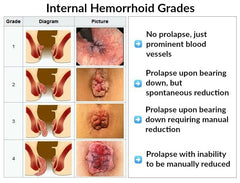Grade 4 Hemorrhoid Guide: Treatment, Options, Reviews & Information
Posted on 24 July 2018 by Maryanne Johnson
Share this post
Grade 4 hemorrhoids are the absolute worst. They are incredibly painful and require immediate attention. Hemorrhoids affect nearly 10 million Americans, and this common gastrointestinal disease is often neglected and ignored by most patients. In fact, only 3 million Americans seek medical treatment from their doctors.
When ignored, hemorrhoids can become much worse, with symptoms inhibiting lifestyles, even making movement painful.
People with hemorrhoids may experience:
- Anal itching (also known as pruritus ani)
- Anal discharge
- Difficulty passing stools
- Small, hard lumps in the anorectal area
- Anorectal stinging
- Throbbing or sharp pain
- Feeling uncomfortable in sitting or standing positions
- Bluish and purple colored blood clots in the rectal area
- A hemorrhoidal prolapse, in which the hemorrhoid is visible, protruding through the rectum
This hemorrhoid supplement can help get you relief from hemorrhoids post-surgery if your doctor approves.
As we age, so do the tissues and muscles in our bodies, and we become more likely to experience specific problems because of this. Hemorrhoids, according to research and doctors, are thought to be one of the consequences of weakening tissues in the rectal area.
Research indicates that with age, hemorrhoids become more inflamed and for men and women in their late 40s and on tend to be more susceptible to hemorrhoid flare-ups.
Of course, there are exceptions to this rule, as hemorrhoids can affect any age group. Typically, pregnant women and women who have just given birth are also prone to having hemorrhoids.
Genetics play a known role in predisposal to hemorrhoids. If you have a family history of hemorrhoids, then your chances of having hemorrhoids are equally high. Coupled with other factors, this could lead to hemorrhoids worsening and potentially reaching a Grade 4 prolapse.
Hemorrhoids become aggravated when the veins and the blood vessels in the rectum have to work harder to transport the blood to this area. Constipation, excessive pressure, and straining are all contributing factors behind hemorrhoids becoming swollen and painful.
What are Grade 4 Hemorrhoids?
Understanding hemorrhoids are to know and learn about what they are. Everyone has hemorrhoids, in actuality, and hemorrhoids are the rectal veins and blood vessels located outside the rectum, and inside of it.
Internal hemorrhoids are measured in grades. This type of hemorrhoid can attract specific complications, mainly a prolapse. A prolapse is slowly occurring, and in most cases of internal hemorrhoids, the prolapse is not a factor (Grade 1), or is relatively mild and can be treated easily by rubber band ligation (Grades 1-3).
Grade 4 hemorrhoids are described as irreducible piles, which have entirely prolapsed outside of the rectum. At this stage, non-operative procedures are not considered, and instead, doctors opt for an invasive surgical treatment approach.
Visibly, Grade 4 hemorrhoids can be seen protruding from the anal opening. They may look like a mixture of blood and flesh-colored lumps, swollen and coated in mucus. You may have a few clusters of prolapsed internal hemorrhoids protruding from the anal opening at once.
Unlike hemorrhoids categorized in Grades 1-3, Grade 4 hemorrhoids can no longer be pushed back inside of the rectum. Grade 4 hemorrhoids will need to be removed entirely from a type of surgical procedure.
How Can I Treat Grade 4 Hemorrhoids?
The importance of treating hemorrhoids at an early stage of their existence is monumental because when they amount to Grade 4 status, treatment options have to become severe and aggressive.
At-home remedies will do little in treating Grade 4 hemorrhoids. In many cases with hemorrhoids in this degree of prolapse, surgical intervention is required to treat hemorrhoids in this stage fully.
The intensity of the symptoms peak at this late stage of prolapse, and no longer do topical treatments like ointments, medicated wipes, and sitz baths seem to work in relieving them. At this point, you cannot and should not treat Grade 4 hemorrhoids yourself.
Your doctor will want to do a surgical evaluation of your hemorrhoids. There are many different types of hemorrhoid surgeries available that are designed to resolve Grade 4 hemorrhoids.
Concerning surgeries and Grade 4 hemorrhoids, no generic option is right for everyone. Every patient is different, and so are his or her hemorrhoids. Operations should be tailored and specified by a patient’s doctor accommodate for their severity, symptoms, and size.
Doctors emphasize that along with surgeries a lifestyle change is needed to keep hemorrhoids from reoccurring. The goal is to make the stool more comfortable to pass, so diet, exercise, weight management, and fluid intake are required.
Softened stools require extra moisture to absorb for bulking purposes. Fiber, stool softening medication, and even laxatives can be apart of a hemorrhoid treatment plan.
Meanwhile, maintaining a healthy and appropriate weight can reduce the amount of stress and pressure placed on hemorrhoidal blood vessels and veins, curbing the chance of inflammation and swelling.
Is Grade 4 Hemorrhoid Surgery Safe?
The most challenging aspect in Grade 4 hemorrhoids is that at this point, the condition has eliminated other means of treatment. Usually, in milder cases of hemorrhoids, rubber band ligation is considered after doctors advise a change of diet, first. Band ligation is a non-operative therapy.
For hemorrhoids that are Grades 1-3, non-operative treatments are considered first, but for Grade 4 hemorrhoids, a hemorrhoidectomy is needed. The complications following this intensive ad invasive surgery is higher than that of the rubber band ligation treatment.
However, the chances of hemorrhoids becoming a reoccurring issue following a hemorrhoidectomy are proven to be low.
Side effects of a hemorrhoid surgery are:
- Inability to urinate or pass stools
- Bleeding
- An infection
- Bladder or bowel incontinence
- Pain
If you have had hemorrhoid surgery and are experiencing any of these side effects, then you should tell your doctor immediately. The sooner you communicate with your doctor, the less of a risk that these side effects will procure worse complications.
Surgeries can be useful if you also work on your toilet habits and your diet. Your doctor will ask you to meet a daily-required intake of fiber and to strive to have softer stools that are less stressful for your body to pass.
Grade 4 Hemorrhoids and Pregnancy
Hemorrhoids become increasingly more frequently occurring during pregnancy. Many pregnant women are subject to worsening hemorrhoids with equally painful symptoms that can cause complications and immense discomfort.
It can be challenging to manage hemorrhoids during pregnancy, and in some cases, hemorrhoids become progressively worse, even reaching Grade 4. Doctors must administer treatment carefully.
Doctors must also consider which medications are safe for their patients to take during their pregnancies.
Women who are pregnant and deliver vaginally are predisposed to hemorrhoids. About 25%-35% of women struggle with hemorrhoids while they are pregnant.
The first step in treating hemorrhoids of the severe Grade 4 stage is by altering the diet.
Added fiber, whether it is consumed via whole foods or from a fiber supplement, is the first step in helping to resolve hemorrhoids, even for Grade 4. A second step may be to add a stool softener to make bowel movements less painful.
For Grade 4 hemorrhoids during pregnancy, your doctor may want to proceed with a surgical evaluation. Certain surgeries can be performed safely during pregnancy for Grade 4 hemorrhoids.
Doctors may want their patients to have a surgery done before the baby is expected to be due to preventing the hemorrhoids from worsening during delivery. In many cases of hemorrhoids and pregnancy, milder forms of hemorrhoids have been shown to resolve the following delivery spontaneously. With Grade 4 hemorrhoids, however, further treatment should be required.
Resolving Grade 4 Hemorrhoids
For Grade 4 hemorrhoids don't leave the treatment up to home remedies with little effect or over the counter medications. To resolve severe prolapsed Grade 4 hemorrhoids, you will require a surgical consultation with your doctor to go through varies options for hemorrhoid removal.
With a change of diet and lifestyle to accompany surgery, you can keep hemorrhoids from flaring up and reaching such a severe state of prolapse.
By remaining diligent in your diet, exercise routine, and toilet habits, you can keep hemorrhoid inflammation to a minimum.
Keeping your doctor updated about your condition is vital. This communication should include telling your doctor about the state of your current hemorrhoids, primarily if prolapse has occurred, any complications following a hemorrhoid surgery, and your condition or potential hemorrhoid reoccurrence post-surgery.






0 comments